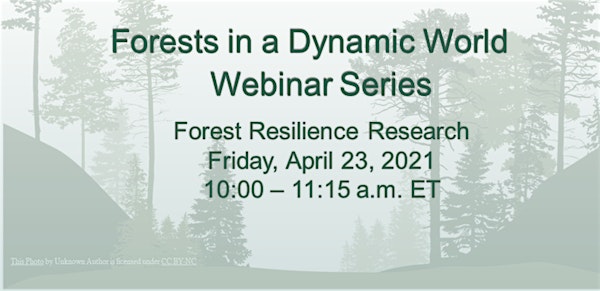
Forests in a Dynamic World Series: Forest Resilience Research
Join us as we delve into current local forest resilience research! Topics and presenters include:
Date and time
Location
Online
About this event
Small forests embedded in developed landscapes: environmental stresses and ecosystem services
Presenter, Dr. Tara L.E. Trammell, John Bartram Assistant Professor of Urban Forestry, University of Delaware
Small forests embedded across developed landscapes are susceptible to adjacent and regional anthropogenic activities, and are ideal for studying the combined effects of global environmental change on ecosystems. At the same time, urban forests experience the greatest interaction with humans and are expected to provide ecosystem services to a large proportion of the population. Dr. Trammell will discuss environmental stressors for small urban forests and potential ways to improve ecosystem service provision.
When did the baby trees stop growing? Using tree ring analysis to date tree regeneration in a transgressing coastal forest
Presenter, Dr. Stephanie Stotts, Associate Professor of Environmental Studies, Wesley College
Coastal forests die and are replaced with salt marsh when salinized under rising seas, a process known as forest-marsh transgression. The first step in this process is a loss of tree regeneration, followed by the growth of salt tolerant plants. Eventually, the trees die, leaving behind a ghost forest. Forest transgression is being studied in detail at the Monie Bay component of the Maryland National Estuarine Research Reserve through a multi-institution, Critical Zone collaboration. One component of this project utilizes tree ring analysis of Loblolly Pine (Pinus taeda) to identify the timing of tree regeneration cessation. The results of this study provide a more complete picture of salinized coastal forest stand-dynamics.
Using Airborne Light Detecting and Ranging (LiDAR) to detect changes in the upland forest canopy in the upland-marsh border in areas of Delaware
Presenter, Lizzy Powell, PhD Student, University of Maryland, Margaret A. Davidson Fellow for DNERR
Low lying coastal ecosystems are experiencing the effects of climate change. Increased flooding and salinity from sea level rise and coastal storms cause coastal marshes to adapt by migrating landward – typically into upland forest or agricultural areas. Most studies measuring marsh migration use maps, aerial photographs, and satellite images to manually digitize the transition zone between upland and marsh and the report the change over time. Here, I will demonstrate that airborne laser scanning (ALS) could be useful to determine where marsh migration occurred and specifically note height changes along the marsh-upland border that are indicative of tree mortality.